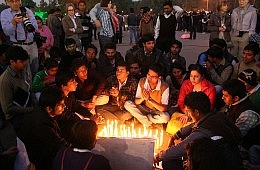The Delhi police filed charges with a local district court on Thursday, setting in motion a trial for the horrific rape case that has gripped the nation in recent weeks. Five of the six men accused of perpetrating the rape are being charged with murder, rape and kidnapping among other charges. If convicted the defendants are nearly certain to be given the death sentence. The sixth man being accused of the rape is a juvenile and will therefore have his case handled by the Juvenile Justice Board.
Late in the evening on December 16th a 23-year-old paramedic student was brutally attacked and raped in a private bus that was driving through the busy streets of the nation’s capital. She died weeks later in a Singaporean hospital as a result of the injuries she sustained during the senseless and barbaric attacks.
The death of Damini, as the victim is popularly known as (her real name has been withheld from the public), has enraged the entire nation and prompted near-continuous protests throughout the capital over the last three weeks.
Enjoying this article? Click here to subscribe for full access. Just $5 a month.Faced with constant and relentless pressure from protestors, politicians and the media, the police acted swiftly in preparing the charge sheet in just twenty days, something extraordinary by the standards of the Delhi police force.
But there are cases not very far from Delhi where victims search in vain for justice for months after the incident.
A case in point is a 16-year-old girl from the state of Haryana in northern India, who was gang-raped by at least eight men in September. The girl was from a poor, lower caste Dalit family, and her multiple attackers were primarily from higher class families who held positions of power in the rural village in which she lived. They raped her for three hours, video-taping their crimes, and threatened to kill her and her family if she told anyone about the attack.
For over a week the girl kept silent out of fear for her life and social prestige in her village. She also doubted that anything would come of telling people of the atrocity she had suffered, given her family’s social status relative to those of her attackers.









